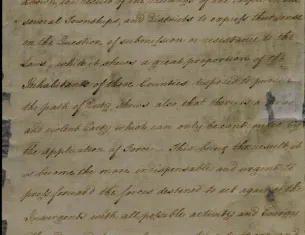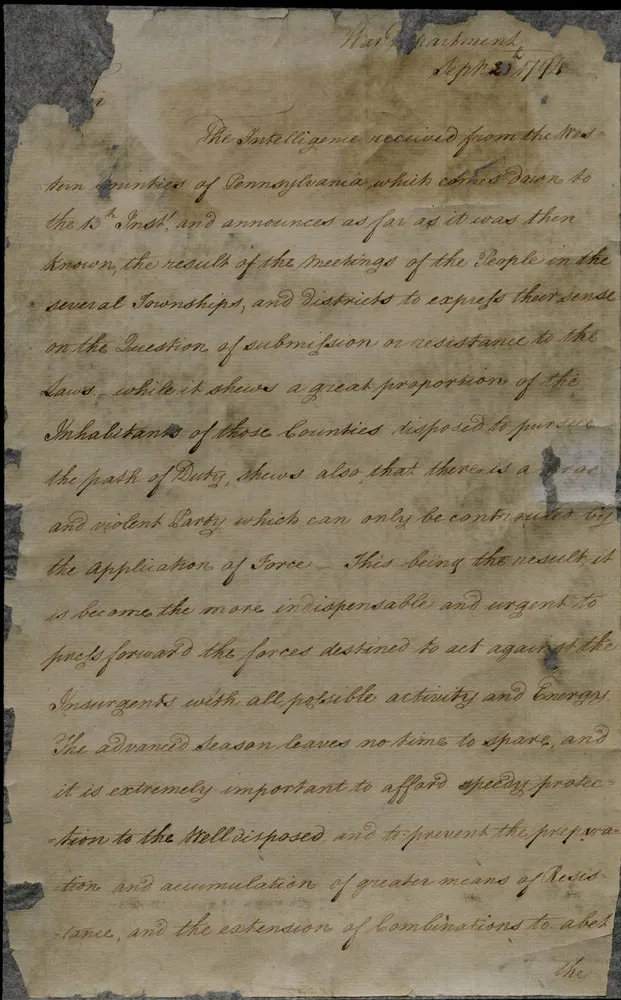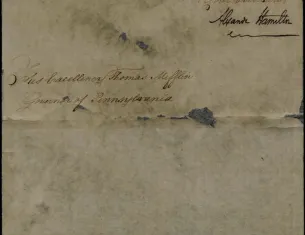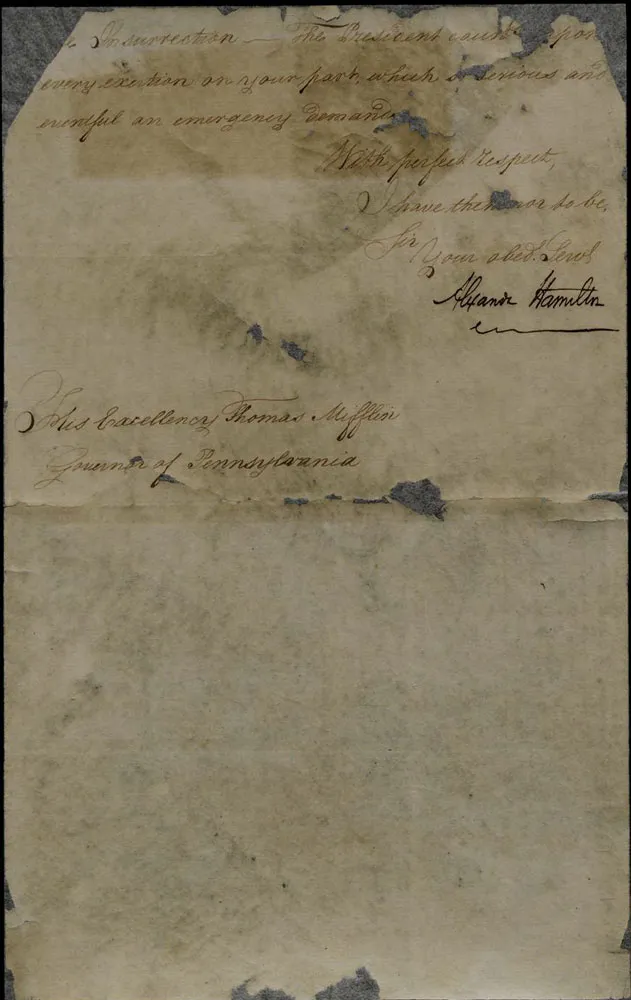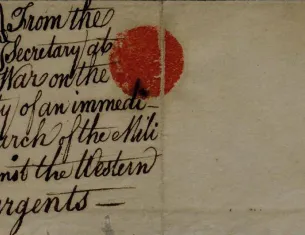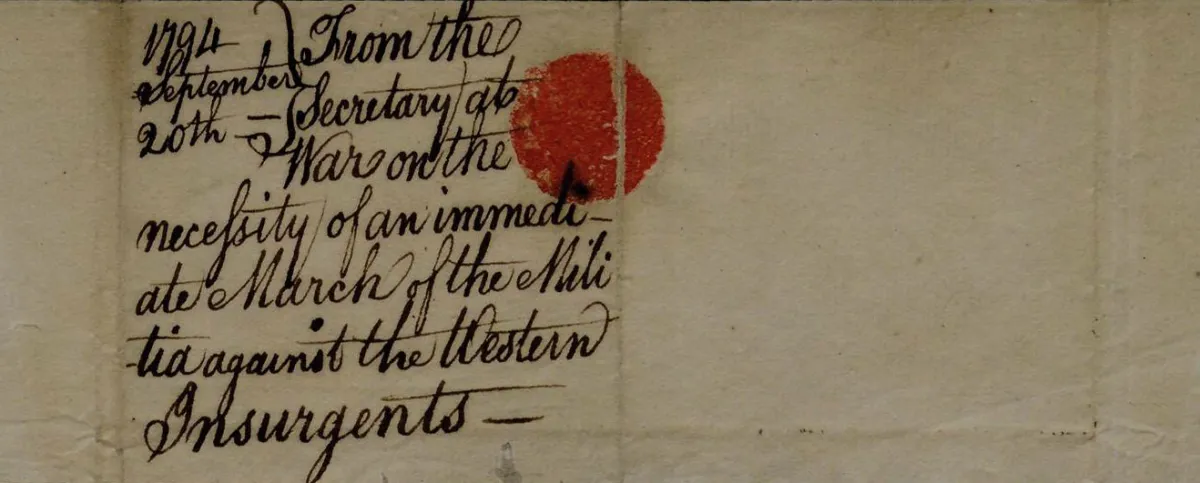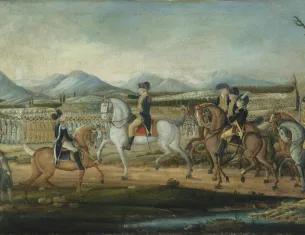Hamilton Asks for Militia to Quell Whiskey Rebellion, 1794
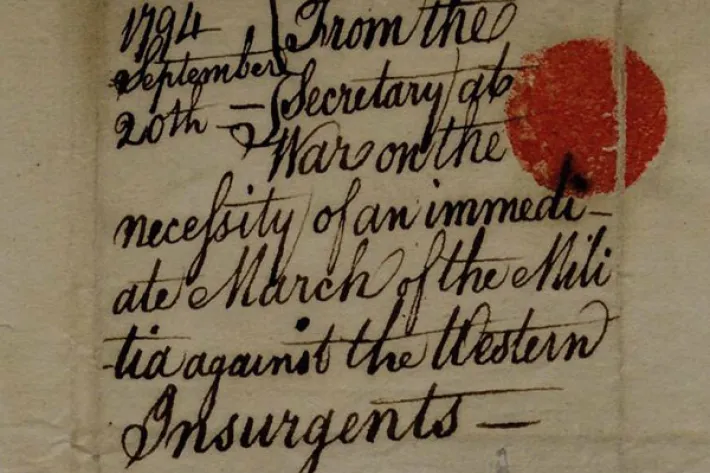
A Letter from Alexander Hamilton to Thomas Mifflin, September 20, 1794 (The Gilder Lehrman Institute of American History)
Protests against the excise tax on whiskey occurred in every state south of New York. By 1794, western Pennsylvanians had had enough. Some 7,000 frontiersmen marched on Pittsburgh to stop the collection of the tax. In July, rebels near Pittsburgh set fire to the home of John Neville, the regional tax collection supervisor. Determined to set a precedent for the federal government’s authority, President George Washington gathered an army of 12,000 militiamen to disperse the rebels. In this letter, Secretary of the Treasury Alexander Hamilton, who had been given command of the army by Washington, reports to Governor Thomas Mifflin of Pennsylvania that it is necessary for the federal forces mobilized by President Washington to quell the Whiskey Rebellion.
Letter from Alexander Hamilton to Thomas Mifflin, September 20, 1794
War Department
Sept. 20th 1794
Sir
The Intelligence received from the Western Counties of Pennsylvania, which comes down to the 13th Inst., and announces as far as it was then known, the result of the meetings of the People in the several Townships, and districts to express their sense on the Question of submission or resistance to the Laws. – while it shews a great proportion of the Inhabitants of those Counties disposed to pursue the path of Duty, shews also, that there is a large and violent Party which can only be controuled by the application of Force – This being the result, it is become the more indispensable and urgent to press forward the forces destined to act against the Insurgents with all possible activity and Energy. The advanced season leaves no time to spare, and it is extremely important to afford speedy protection to the well disposed, and to prevent the preparation and accumulation of greater means of Resistance, and the extension of Combinations to abet the Insurrection—The President counts upon every exertion on your part, which so serious and eventful an emergency demands.
With perfect respect,
I have the honor to be
Sir Your obedt. Servt.
Alexander Hamilton
His Excellency Thomas Mifflin
Governor of Pennsylvania
Source: Alexander Hamilton to Thomas Mifflin, September 20, 1794, The Gilder Lehrman Institute of American History, GLC07920
A Letter from Alexander Hamilton to Thomas Mifflin, September 20, 1794
War Department
Sept. 20th 1794
Sir
The Intelligence received from the Western Counties of Pennsylvania, which comes down to the 13th Inst., and announces as far as it was then known, the result of the meetings of the People in the several Townships, and districts to express their sense on the Question of submission or resistance to the Laws. – while it shews a great proportion of the Inhabitants of those Counties disposed to pursue the path of Duty, shews also, that there is a large and violent Party which can only be controuled by the application of Force – This being the result, it is become the more indispensable and urgent to press forward the forces destined to act against the Insurgents with all possible activity and Energy. The advanced season leaves no time to spare, and it is extremely important to afford speedy protection to the well disposed, and to prevent the preparation and accumulation of greater means of Resistance, and the extension of Combinations to abet the Insurrection—The President counts upon every exertion on your part, which so serious and eventful an emergency demands.
With perfect respect,
I have the honor to be
Sir Your obedt. Servt.
Alexander Hamilton
His Excellency Thomas Mifflin
Governor of Pennsylvania
Source: Alexander Hamilton to Thomas Mifflin, September 20, 1794, The Gilder Lehrman Institute of American History, GLC07920.
insurrection - a violent uprising
Background
Protests against the excise tax on whiskey occurred in every state south of New York. By 1794, western Pennsylvanians had had enough. Some 7,000 frontiersmen marched on Pittsburgh to stop the collection of the tax. In July, rebels near Pittsburgh set fire to the home of John Neville, the regional tax collection supervisor. Determined to set a precedent for the federal government’s authority, President George Washington gathered an army of 12,000 militiamen to disperse the rebels. In this letter, Secretary of the Treasury Alexander Hamilton, who had been given command of the army by Washington, reports to Governor Thomas Mifflin of Pennsylvania that it is necessary for the federal forces mobilized by President Washington to quell the Whiskey Rebellion.
Transcript
Letter from Alexander Hamilton to Thomas Mifflin, September 20, 1794
War Department
Sept. 20th 1794
Sir
The Intelligence received from the Western Counties of Pennsylvania, which comes down to the 13th Inst., and announces as far as it was then known, the result of the meetings of the People in the several Townships, and districts to express their sense on the Question of submission or resistance to the Laws. – while it shews a great proportion of the Inhabitants of those Counties disposed to pursue the path of Duty, shews also, that there is a large and violent Party which can only be controuled by the application of Force – This being the result, it is become the more indispensable and urgent to press forward the forces destined to act against the Insurgents with all possible activity and Energy. The advanced season leaves no time to spare, and it is extremely important to afford speedy protection to the well disposed, and to prevent the preparation and accumulation of greater means of Resistance, and the extension of Combinations to abet the Insurrection—The President counts upon every exertion on your part, which so serious and eventful an emergency demands.
With perfect respect,
I have the honor to be
Sir Your obedt. Servt.
Alexander Hamilton
His Excellency Thomas Mifflin
Governor of Pennsylvania
Source: Alexander Hamilton to Thomas Mifflin, September 20, 1794, The Gilder Lehrman Institute of American History, GLC07920
Excerpt
A Letter from Alexander Hamilton to Thomas Mifflin, September 20, 1794
War Department
Sept. 20th 1794
Sir
The Intelligence received from the Western Counties of Pennsylvania, which comes down to the 13th Inst., and announces as far as it was then known, the result of the meetings of the People in the several Townships, and districts to express their sense on the Question of submission or resistance to the Laws. – while it shews a great proportion of the Inhabitants of those Counties disposed to pursue the path of Duty, shews also, that there is a large and violent Party which can only be controuled by the application of Force – This being the result, it is become the more indispensable and urgent to press forward the forces destined to act against the Insurgents with all possible activity and Energy. The advanced season leaves no time to spare, and it is extremely important to afford speedy protection to the well disposed, and to prevent the preparation and accumulation of greater means of Resistance, and the extension of Combinations to abet the Insurrection—The President counts upon every exertion on your part, which so serious and eventful an emergency demands.
With perfect respect,
I have the honor to be
Sir Your obedt. Servt.
Alexander Hamilton
His Excellency Thomas Mifflin
Governor of Pennsylvania
Source: Alexander Hamilton to Thomas Mifflin, September 20, 1794, The Gilder Lehrman Institute of American History, GLC07920.
insurrection - a violent uprising
